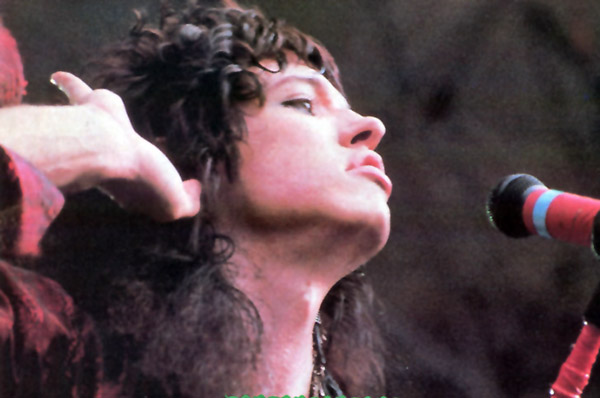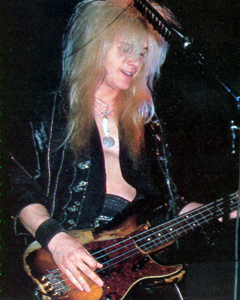
|
Search JoyZine with Google Site Search! |
Cinderella Interview by Anne Raso
The more things change, the more they stay the same—just ask Cinderella's pouty-mouthed lead singer/songwriter/rhythm guitarist/businessman Tom Keifer. Despite the fact they've gone from rags to riches since their debut LP, Night Songs, hit the record store shelves in late '86, they still tour by bus and stay in the same old cut-rate motels. "I like the bus," says Tom. "For us, the bus is home. We hang out there together without any record company people, managers or fans around. We play acoustic guitars, drink and get buzzed on these long 500-mile rides. It's cool! We love the bus, man, it's great. If there's a really long drive—like 24 hours or something—we'll fly. But most tours are routed so that you drive no more than 500 miles to the next gig. It's great. We just sit up all night and jam or watch movies, and it's cool. That's what rock'n'roll is about, to me—a bus!" But isn't it a little rough to have to put on a show after trying to sleep amidst rumblings from a tour bus engine? Tom answers, "Well, when we check in the next morning, we just sleep all day. We get in at five or six in the morning, sleep 'til noon, get up and do our interviews or laundry or whatever—and just go to the show." But there's also an off-the-road Tom who lives in central New Jersey, drives an '85 Jaguar to the local A&P grocery store, and visits his mother. But, still, he wouldn't quite call it a normal home life. "What's normal?" he asks with more than a touch of cynicism. "I don't know if it's totally normal, because when I come home—which is when I have two or more weeks off—I just do whatever I want. I don't have to work." Instead, he collects. In the past year Tom has amassed a guitar collection that would put Eddie Van Halen's to shame. His house has been overtaken by the axes (and a Steinway baby grand), much to his wife Emily's chagrin. "When it comes to collecting guitars," shrugs Keif, "I'm sick! It's pretty ridiculous. I don't even know how many I have. When I see one and I like it, I just have to get it. It's just part of American rock'n'roll history. There's a lot of reasons why I love 'em more than just the way they play and sound, anymore. It's more like a hobby; I'm not buying the guitars to play, necessarily. I mean, I play them all in the studio or live, and I just can't get enough of them, but more or less I'm buying them just to have them." He's gone so far as to have a guitar expert, Tom Levin, bring him guitars to buy or trade. "He's a vintage dealer in Philly who is a real guitar snob. He's really picky about what kind of guitars he buys and sells. I bought everything from him except for the first few, which I got at a big guitar show in Texas a year ago." Jay found me a J-200, a Gibson acoustic guitar from 1953; it's a real one-of-a-kind. Everything he gets me is the rarest of rare, just some really great guitars. He comes over to the house with an entire van of guitars; I don't even have to go anywhere. I just call him up, he comes over just about immediately, leaving a pile of guitars here for me to test out. I'll call him and say, 'I like this one and this one and this one,' then I pay him for the ones I took the previous week and he shows me five more!" According to the press, guitars are Tom's only addiction. But, says Tom, "We have a clean reputation because we don't feel we need to brag about what we do. What we do is our business. I mean, it's just not important. You know, if I have a drinking problem, that's my problem. I shouldn't burden the world with it. To us, that's just not what music's about. Whether we're clean-living or whether we're not, no one's ever going to fucking know because it's no one's business. That's more our attitude, more than trying to set a good example or whatever. And if you really had a problem, you wouldn't want anybody to know about it, anyway."
Whether Tom and the boys are party animals or not, Mr. K's voice is always in prime shape, unlike other heavy metal howlers whose cords are strained from the constant climate changes, drinking, air conditioning, the dry air on tour buses and millions of other factors. Instead, he claims, "My voice gets stronger as a tour goes on. And I don't even really warm up before a show; I'll usually just sing a little in the dressing room before I go on. It all depends on how I feel; it just depends on the day." Still, it's utterly amazing that Tom's voice stayed strong through the now-notorious sessions for the album, which, according to everyone in the band, were something straight out of hell. Producer Andy Johns walked out during the mixing, making the album miss its original release date by several months. Rumors were flying: Fred Coury was flubbing his drum parts, or leaving the band; and that an A&R guy at PolyGram disapproved of the final mix and the boys had to start from scratch again. Now, Keifer can see the silver lining that was in the cloud. "You know, sometimes tension is what really makes you go. It's like pressure and tension and upset and turmoil kind of feed the fire. I'm not saying that I'd want to go through all this shit again, but I think that every album has its vibe, and that was the vibe for this one." In fact, it was the time-honored heavy metal nightmare, and many fans of the group were worried that upon the album's release Cinderella would be relegated to the bins as another Spinal Tap. Instead, the new disc wound up topping the band's previous effort by a landslide. Critics were amazed at how much the band's sound had matured in less than two years. Cynics might think that some corporate committee had molded the Cindies' sound (or glam look) on their first record, and then let them have complete creative control on the second. But that simply wasn't the case. The 14 months the band spent on the road to promote Night Songs had broadened and seasoned them in a very drastic way. Tom insists that, "no one tried to mold our sound on the first record, at all. I think the difference between the albums is that we're just more experienced now, and because of that, the second album sounds different. We gathered knowledge and experience on the road. And knowledge and experience give you freedom, because the more you know, the more you're free to do. The record company has never really fucked with our sound. They knew what we were when they signed up, and they just put us in the studio and said, 'Do your own thing.'" Oddly enough, Tom says he doesn't see a drastic difference between the albums. "It doesn't seem that drastic because I was there each step of the way, I guess. It's hard for me to step back and really look at it clearly because I was involved so directly in each project."The band, too, suffered fears they'd bomb and wind up becoming charter members of the dreaded One-Album-Wonder Hall of Fame. But in all honesty," Tom reveals, "I don't care who you are, rock musicians are paranoid in general because making records is like laying your heart on the line. Everybody worries about and cares about what their record does and what people think of it. That's because that record is you. But, you have to live with that little bit of paranoia, you have to go on with your life. You can't really worry about it. What's going to happen is going to happen. You do your best, and that's all anybody could expect. I know we did more than our best on this record—we really put our hearts into it—and when we go out and play live, we want to do our best, give it all we've got. And that's all you can do." Whether you sell two or 2,000,000 copies of an album, you can't change (the paranoid feeling] because that's just how it goes. You can sit around and go 'How are we going to deal with this or that,' but when you go on stage you've gotta go 'It's time to rock!'" In this life, nothing comes easy. Not just recording, but touring, too, can take it's toll, especially on a musician's personal life. In Cinderella's case, wives and girlfriends sometimes come out on weekends, or the boys go home if they have a few days off. (Bassist Eric Brittingham became a daddy in December, so he's got double the reason to sneak off the road every now and then.) "We've gotten used to that way of life," reveals Tom. "We spent 14 months on the road (to support the first album). At the end of that we thought, 'you've survived 14 months on the road, you can survive anything!" Even so, Tom has fond memories of the tour of Japan, partially due to the unique way the fans showed their dedication. "They just follow you around on the street, but don't say anything unless you say to them 'Come over here.' Its funny, because you'll be walking down a street in Tokyo and you'll feel like you're being followed. And when you turn around, all these kids will duck behind a building! They're very polite people, and I guess they feel that it would be rude to go up to a performer and say, 'Give me your autograph' or 'I really love your music,' or whatever." They're just beginning to have more than one band on a bill—Bon Jovi's going over there with a couple of other big-name bands. "It's weird, because when you play by yourself you open at 7:00 and play for two hours, and then the audience just kind of sits there and claps very politely." All the fame notwithstanding, they've managed to remain good ol' Philly boys who are happy if they get to eat out once a week. They've come a long way from the days when they used to eat the burgers thrown into the dumpsters at Burger King at closing time. Through it all, Tom was on his own, refusing help from his parents. How have they reacted to his success? "Well, they don't treat me any differently; they're really happy for me, though. I think that maybe when I first got out of high school and didn't decide to go to college and become a lawyer, they weren't thrilled. When I said I wanted to become a rock star, they thought I was a little off the track. I mean, it's not an easy thing to break into. But now, I think they're really happy that I achieved what I set out to do." |

